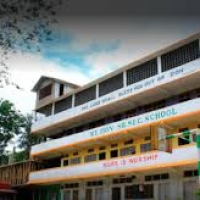Where is Mt Zion English School ?
Mt Zion English School is Located in Imphal , Manipur, India
Address of Mt Zion English School, Imphal
Karong,
Imphal
Manipur 795007
+91- 94360 86705
+91–9774413470
mtzionsrsecschool@gmail.com
How do I contact Mt Zion English School?
Call at +91- 94360 86705 to contact Mt Zion English School
About Mt Zion English School
It is located at the foot hill of Kathikho Karong a few yards away from National High way No. 2. It gives a beautiful sight and can have a view of the Barak river and the surrounding hills, valley and villages from the school, the environment is ideal and provides good atmosphere for sound education. The aim of the school is to fulfill the students obligation towards God, Family and Society and that they may have life, life in all its fullness.so today we are so privilege, that we could see all these in CBSE,the uniqueness of CBSE is not only learning the text, but it opens the mind for creative thinking, solving problems and making decision in life skills of the learner from the early stage and also guiding the administrator's and teacher's to mould the children's in a proper way, so with the yeoman's service rendered by the school with firm determination by facing many untold miseries and hardship it radiates the ray of hope in the minds of the people, from its initial stage till date and tremendously transformed the out look and attitude of the people, for which it invariable become the cynosure and a centre of learning. Lastly, we do hope and pray that simple, religious,educated and cultured students will one day come out from our school to be the leaders of tomorrow, and an agents of positive changes from darkness to light with this hope and prayer, I dedicate the service of the school to needy people.
It has long connected the Indian subcontinent and Central Asia to Southeast Asia, China (or East Asia), Siberia (Russia), Micronesia and Polynesia, enabling migration of people, cultures and religionsDuring the days of the British Indian Empire, the Kingdom of Manipur was one of the princely states Between 1917 and 1939, some people of Manipur pressed the princely rulers for democracy By the late 1930s, the princely state of Manipur negotiated with the British administration its preference to continue to be part of the Indian Empire, rather than part of Burma, which was being separated from India These negotiations were cut short with the outbreak of World War II in 1939.
On 11 August 1947, Maharaja Budhachandra signed an Instrument of Accession, joining India Later, on 21 September 1949, he signed a Merger Agreement, merging the kingdom into India, which led to its becoming a Part C State This merger was later disputed by groups in Manipur, as having been completed without consensus and under duress The dispute and differing visions for the future has resulted in a 50-year insurgency in the state for independence from India, as well as in repeated episodes of violence among ethnic groups in the state From 2009 through 2018, the conflict was responsible for the violent deaths of over 1000 people.
The Meitei ethnic group represents around 53% of the population of Manipur state, followed by various Naga tribes at 24% and various Kuki-Zo tribes at 16% The main language of the state is Meiteilon (also known as Manipuri) Tribals constitutes about 41% of the state population(according to 2011 census) and are distinguished by dialects and cultures that are often village-based Manipur's ethnic groups practice a variety of religions According to 2011 census, Hinduism is the major religion in the state, closely followed by Christianity.
Other religions include Islam, Sanamahism, Buddhism, Judaism etcManipur has primarily an agrarian economy, with significant hydroelectric power generation potential It is connected to other areas by daily flights through Imphal airport, the second largest in northeastern India Manipur is home to many sports and the origin of Manipuri dance, and is credited with introducing polo to Europeans
